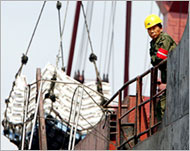WFP to resume food aid to N Korea
The World Food Programme has reached agreement with North Korea to resume food aid after a six-month suspension, but the operation will be smaller than it was, according to the UN agency.

The WFP will feed 1.9 million of the “most needy” people in the North, Tony Banbury, the agency’s Asia regional director, said at a news conference in Beijing on Thursday. That is down from the 6.5 million people the agency was feeding in past years.
The WFP suspended aid in December after the North asked it to switch focus to economic development. The agency argued that the change was too abrupt and would leave millions hungry.
The new agreement was signed on Wednesday in Pyongyang, Banbury said.
“We would have liked to see a bigger operation, but that was not possible at this time,” he said.
Banbury didn’t give a date for food distribution to resume, but he said the agency was making preparations.
Mismanagement
North Korea has relied on foreign donations to feed its people since disclosing in the mid-1990s that its state-run farm system had collapsed after decades of mismanagement and the loss of Soviet subsidies. Famine is believed to have killed two million people.
But the secretive government of North Korean leader Kim Jong-il restricted activities of aid agencies and pressed them to reduce the size of their foreign staffs in the country.
 |
|
Donors want to make sure food |
Under the new agreement, the WFP will be allowed 10 foreign staff members in North Korea and an office in the capital, Pyongyang, Banbury said.
In the past, the agency had 32 foreigners in the country and five regional offices in addition to the capital.
Banbury said the agency would supply food aid only in areas where it could monitor distribution to assure foreign donors that it was reaching its intended beneficiaries.
The US and other donors want to see that food isn’t diverted to the North’s huge military or to reward ruling party supporters.
Efforts to avert starvation in the North have coincided with lengthy disarmament negotiations aimed at persuading Kim’s government to give up nuclear development.
Aid decisions
Governments pushing for denuclearisation include the US, rival South Korea and Japan, which also are among the North’s main food donors. They say they have kept aid decisions separate from the nuclear talks.
The North says its harvests have improved enough in recent years that it should be able to feed itself with help from South Korea and China, the North’s main ally and aid donor.
|
“We would have liked to see a bigger operation, but that was not possible at this time” Tony Banbury, |
The WFP has called the North’s request to shift focus to the economy a sensible long-term move. But it has warned that harvests are still small enough that without additional foreign aid, shortfalls could lead to widespread hunger.
Late last year, the North expelled the 12 private foreign aid groups working in the country after the European Union sponsored a UN resolution criticising its human-rights record.
The WFP says it has spent $1.7 billion over the past decade on aid to the North in the agency’s biggest aid project.